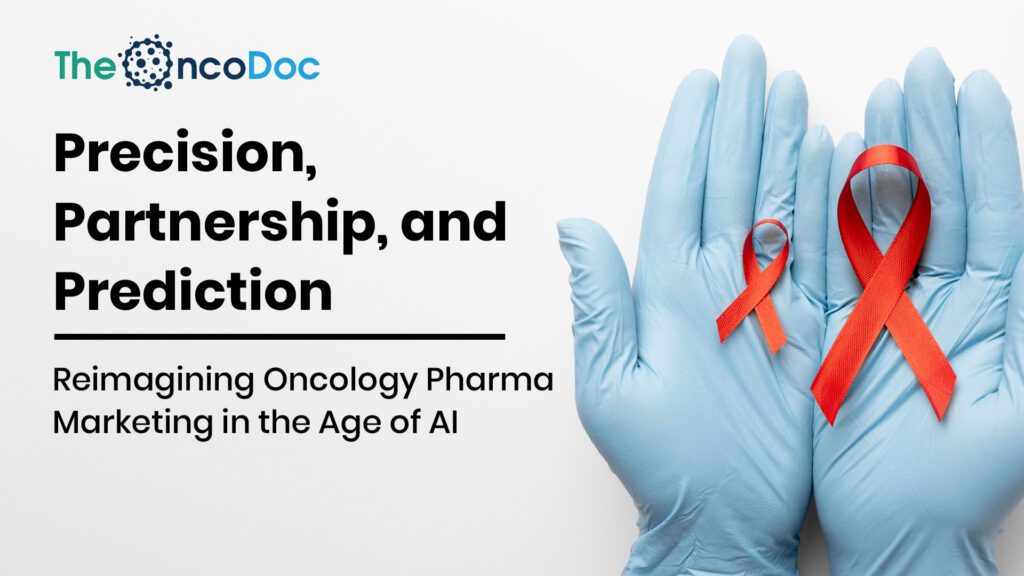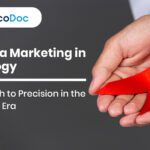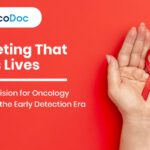Introduction: Reframing Oncology Pharma Marketing Through the Lens of AI
Oncology is undergoing a seismic transformation. The rise of precision medicine, immunotherapies, and biomarker-driven protocols has made treatment decisions more nuanced than ever. However, while science surges ahead, the marketing strategies used by many pharma companies remain rooted in outdated, broad-based tactics. Static emails, blanket messaging, and product-first outreach fail to resonate with today’s oncologists, clinicians who demand personalized, evidence-backed, and time-sensitive insights.
Amid this gap, Artificial Intelligence (AI) emerges as a pivotal enabler. AI has the potential to redefine pharma marketing from a transactional push model to a value-driven, partnership-oriented approach. By leveraging machine learning, natural language processing, and predictive analytics, pharma teams can deliver tailored content, identify clinical priorities, and respond to oncologists’ needs in real time.
This article explores how AI can elevate oncology pharma marketing into a more trusted, insightful, and outcomes-aligned discipline. From segment-of-one personalization to real-world data dissemination and ethical AI deployment, we’ll examine how marketers can go beyond engagement and build enduring relationships with oncologists that ultimately benefit patient care.
Section 1: The Urgency of AI Integration in Oncology Pharma Marketing
Artificial Intelligence is no longer confined to diagnostic labs or futuristic research papers, it has become a vital tool in today’s healthcare ecosystem. In oncology, AI is already enhancing imaging interpretation, streamlining clinical workflows, and enabling more precise treatment pathways. Yet, when it comes to pharma marketing, its adoption remains limited and under-leveraged.
Why AI Is Critical for Oncology Marketers Today:
- Information Overload: Oncologists are inundated with constant medical updates, clinical trials, and treatment innovations. Manually navigating this data deluge is impossible without intelligent filtering.
· Demand for Personalization: Content that is designed to fit all users is no longer relevant.
Physicians expect insights that align with their subspecialty, geographic context, and patient profiles.
- Severe Time Constraints: With high patient volumes and packed schedules, oncologists have minimal time for generic outreach. Pharma must meet them where they are, on their terms, at their convenience.
AI equips pharma marketers with the tools to track digital behavior, analyze engagement trends, and deliver content that’s timely, relevant, and valuable. Instead of broadcasting mass messages, AI enables the creation of personalized learning journeys for each clinician, built around their unique interests and clinical challenges.
This paradigm shift moves pharma marketing from reactive promotions to proactive education, positioning brand teams not as sellers, but as trusted partners in oncology care.
Section 2: Segment-of-One Targeting through Predictive Analytics
Traditional segmentation relies on broad personas, “medical oncologist in tier-1 city” or “surgical oncologist with 10+ years of experience.” AI changes the game by enabling segment-of-one targeting.
How It Works:
- Behavioral clustering using machine learning identifies hidden patterns in engagement (e.g., an oncologist who reads about HR-positive breast cancer at 10 p.m. on weekdays).
- Predictive triggers analyze historical clickstream data, EMR usage patterns, and social signals to suggest when and what content should be delivered.
· Dynamic content engines adjust depth, formats, and headlines according on user choices.
Percentage of Oncologists Who Engage with Personalized vs Generic Pharma Content
Interpretation: Personalization drives nearly 3x higher engagement, a trend AI amplifies.
Section 3: Conversational Marketing, NLP, and Chatbots in Oncology
Pharma representatives are no longer the sole point of contact. HCPs can now receive on-demand guidance, support, and education from conversational AI using intelligent chatbots and natural language processing tools.
Use Cases in Oncology:
- Drug navigation assistants that explain MOA, contraindications, or side effect management interactively.
- Clinical triage support during CME events or digital congress booths.
- 24×7 KOL concierge bots offering curated articles, trial updates, or slides based on real-time queries.
These bots can handle multilingual queries, ensure compliance, and offer personalization at scale, a feat impossible through human reps alone.
Section 4: Building Omni-Channel Journeys with AI Orchestration
Oncology HCPs traverse multiple platforms, LinkedIn, Medscape, webinars, YouTube, and specialist forums. AI has the ability to seamlessly integrate this disjointed journey.
Key Tactics:
- AI-based attribution models identify which channels lead to conversions or deeper engagement.
- Journey mapping engines predict next-best-action: Did the oncologist watch a MOA video? Then offer a case study.
- Programmatic content deployment adjusts messaging across devices and platforms based on interaction history.
Channel Effectiveness Score (Out of 10) for Various AI-Optimized Touchpoints in Oncology Marketing
Insight: AI enhances HCP satisfaction and improves marketing ROI by optimizing channel orchestration.
Section 5: Leveraging AI for Real-World Evidence Dissemination
Today’s oncologists are skeptical of polished clinical trial brochures. They want real-world outcomes, peer experiences, and region-specific case insights.
AI Enables:
- Automated data summarization of published literature into digestible visual formats.
- Sentiment analysis of physician feedback and forums to identify emerging gaps.
· Tools for visual storytelling that create comparative dashboards using registration data.
For instance, a breast cancer specialist in Delhi may prefer to see real-world survival stats from similar patients in India, rather than global Phase III trial results.
Section 6: Ethical Guidelines for Pharma Campaigns Driven by AI
The power of AI also demands responsibility. Misuse can erode trust irreversibly. Oncology, being life-critical, requires the highest standards of digital ethics.
Guidelines for Ethical AI Use:
- Bias auditing: Ensure AI models do not over-index content to certain specialists or geographies.
- Explainability: Let oncologists know why a particular insight or recommendation was shown to them.
- Regulatory compliance: Adhere to local and global standards (e.g., Indian UCPMP, GDPR, IFPMA).
Pharma’s Role:
Pharma must position itself not as a manipulator of data, but as a guardian of digital integrity, making AI explainable, equitable, and evidence-driven.
Section 7: Case Study – AI-Enhanced Oncology Webinar Series
Context: A mid-sized oncology brand in India launched a webinar series targeting early-career medical oncologists.
AI Deployment:
- Used NLP to extract trending topics from oncology forums.
- Used CRM behavior data to select time slots and preferred speakers.
- Deployed chatbots for reminder nudges and live session Q&A.
Outcome:
- 3x higher attendance than previous campaigns.
- 60% of attendees engaged post-event via educational content.
· Within two months, brand recall increased by 42%.
Takeaway: AI turned a passive webinar into an interactive, longitudinal learning experience.
Section 8: Empowering Field Teams with AI Insights
AI doesn’t replace your field representatives; it supercharges them. By providing powerful, data-driven insights, AI enables your teams to work smarter, not just harder, leading to more impactful interactions and better outcomes.
Tools for Smarter Field Force Deployment:
- Geo-AI Mapping: This innovative tool uses geographical data and AI to pinpoint under-engaged regions that also have a high patient volume. This lets your teams focus efforts where they’ll make the biggest difference, optimizing resources and expanding reach.
- KOL (Key Opinion Leader) Scoring: Imagine knowing which physicians are most likely to advocate for your products. KOL scoring uses AI to predict this by analyzing their behaviors and influence. This helps your teams prioritize engagements with healthcare professionals most likely to champion your offerings.
- Dynamic CLM (Closed-Loop Marketing): Traditional detailing aids can be static, but with Dynamic CLM, they’re personalized. This AI-powered tool tailors detailing aids in real-time based on individual doctor preferences. This ensures every conversation is highly relevant and engaging.
Ultimately, when field teams are supported by AI, they deliver more relevant conversations, not just more frequent ones.
Section 9: Partnering with Public Health, NGOs, and Survivors
AI in oncology pharma marketing is most powerful when it goes beyond algorithms and connects with the realities on the ground. While AI provides insights at scale, its true potential is unlocked through collaboration with public health bodies, NGOs, and patient communities. These partnerships ground digital intelligence in lived experiences, regional nuances, and community-level data.
Key Partners in the AI-Driven Ecosystem:
- NGOs and cancer registries contribute anonymized patient data, enabling AI tools to detect epidemiological patterns, care disparities, and treatment outcomes.
- Survivor networks bring authenticity and emotional depth, using AI platforms to curate powerful, localized narratives that resonate with both patients and physicians.
- Public health departments use AI models to map gaps in early detection, identify high-risk geographies, and optimize referral pathways.
These collaborations add a layer of human insight to AI models, ensuring the strategies are not only intelligent but also inclusive and impact-driven.
Illustrative Case: In Maharashtra, a joint initiative between a pharma company, an NGO, and district health officials leveraged AI to identify underserved blocks with high cervical cancer incidence but low screening uptake. The result: hyper-targeted outreach campaigns, mobile screening units, and improved diagnosis timelines.
In short, AI’s success in oncology marketing hinges on co-creation with those who live and work closest to the problem. The future belongs to pharma brands that see partnerships not as PR, but as a strategic pillar in delivering smarter, more equitable cancer care.
Section 10: Metrics That Matter, Beyond Clicks
Clicks and impressions are vanity metrics. In oncology, pharma marketing success is measured by clinical behavior change and trust.
AI-Driven Metrics to Monitor:
- Time-on-tool: Avg. time spent on an AI-powered dose calculator or diagnostic tool.
- Peer-to-peer share rate: How often HCPs share your explainer videos or tools.
- Behavioral shifts: Adoption rate of your molecule post-exposure to a predictive educational series.
- Retention signals: Recurring logins, resource downloads, or physician-initiated contact.
Platforms That Help:
- IQVIA’s OCE: Unified HCP journey analytics
- Veeva Nitro: AI-integrated marketing data lake
- Adobe Experience Cloud: Predictive personalization tools
Section 11: The Future Forward, Blending AI Intelligence with Human Intuition
As oncology pharma marketing enters its next chapter, the true advantage lies not in choosing between AI or human insight, but in combining both. AI delivers scale, speed, and precision, but it’s human understanding that brings nuance, compassion, and ethical grounding. The most impactful campaigns will be those that balance machine-driven efficiency with marketer-driven empathy.
Strategic Priorities for Pharma Teams:
- AI Fluency Across Roles: While marketers don’t need to code algorithms, they must grasp AI’s capabilities, constraints, and ethical implications to use it responsibly.
- Modular Content Strategy: AI thrives on experimentation. Teams should be equipped to create adaptable content blocks that can be tested, optimized, and recombined in real time.
- Collaborative Ecosystems: True transformation requires pharma to move beyond silos. Engaging oncologists, tech partners, advocacy groups, and even patients in co-creation will build trust and unlock deeper insights.
Human-AI collaboration represents Oncology Marketing 2.0, an era where data informs, but humans interpret; where automation delivers, but empathy resonates. By embracing this blended approach, pharma can evolve from being content distributors to becoming meaningful contributors in a clinician’s journey.
Ultimately, it’s not just about marketing smarter, it’s about connecting deeper, acting faster, and aligning better with the realities of oncology care. This is the path forward for pharma brands that aim not just to compete, but to lead.
Conclusion: Redefining Success, Trust as the Ultimate ROI
In today’s AI-powered healthcare environment, trust is no longer a byproduct, it’s the benchmark. For oncology pharma marketers, the ability to build trust determines long-term influence, relevance, and clinical impact. AI, when applied responsibly, is not just a technological asset, it becomes a conduit for credibility and connection.
With ethical and thoughtful deployment, AI empowers pharma marketers to:
- Deliver evidence-based value that resonates with clinicians’ needs
- Combat digital fatigue by serving only high-utility, context-aware content
- Support better patient care, not through promotion, but through precision-driven education
Oncologists today are not seeking another product pitch; they are seeking informed partners who understand the weight of their clinical decisions and the urgency of real-world challenges. AI can help pharma marketers become that partner, facilitating relevant insights, reducing noise, and providing clarity where there is complexity.
By aligning marketing strategies with AI’s capabilities, pharma brands can transition from being background advertisers to frontline enablers of meaningful care. The future belongs to those who treat every interaction as a moment to build trust, not push product.
In the oncology world, trust is the new KPI, and AI, when used with empathy and ethics, is the path to earning it.
The Oncodoc team is a group of passionate healthcare and marketing professionals dedicated to delivering accurate, engaging, and impactful content. With expertise across medical research, digital strategy, and clinical communication, the team focuses on empowering healthcare professionals and patients alike. Through evidence-based insights and innovative storytelling, Hidoc aims to bridge the gap between medicine and digital engagement, promoting wellness and informed decision-making.



